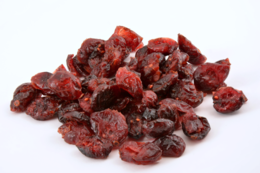Dried cranberries are made by partially dehydrating fresh cranberries, a process similar to making grapes into raisins.[1] They are used in trail mix, salads, breads, with cereals, or eaten on their own. Dried cranberries may be marketed as craisins due to the similarity in appearance with raisins, although the word "Craisin" is a registered trademark of Ocean Spray.[2] Craisins were introduced as part of a packaged cereal produced by Ralston Purina in 1989.[1]

Most commercially produced dried cranberries contain added sugar,[1] and may be coated with vegetable oil to inhibit stickiness.[3]
Nutrition edit
| Nutritional value per 100 g | |
|---|---|
| Energy | 308 kcal (1,290 kJ) |
82.8 g | |
| Sugars | 72.56 g |
| Dietary fibre | 5.3 g |
| Vitamins | Quantity %DV† |
| Vitamin A equiv. | 0% 2 μg0% 27 μg138 μg |
| Thiamine (B1) | 1% 0.013 mg |
| Riboflavin (B2) | 2% 0.028 mg |
| Niacin (B3) | 3% 0.548 mg |
| Vitamin B6 | 2% 0.038 mg |
| Choline | 2% 8.3 mg |
| Vitamin C | 0% 0.2 mg |
| Vitamin E | 14% 2.1 mg |
| Vitamin K | 6% 7.6 μg |
| Minerals | Quantity %DV† |
| Calcium | 1% 9 mg |
| Copper | 7% 0.063 mg |
| Iron | 2% 0.39 mg |
| Magnesium | 1% 4 mg |
| Phosphorus | 1% 8 mg |
| Potassium | 2% 49 mg |
| Selenium | 1% 0.6 μg |
| Sodium | 0% 5 mg |
| Zinc | 1% 0.1 mg |
| Other constituents | Quantity |
| Water | 15.79 |
| †Percentages estimated using US recommendations for adults,[4] except for potassium, which is estimated based on expert recommendation from the National Academies.[5] | |
The nutrient content of dried cranberries may vary depending on the extent of dehydration, amount of sugar added during processing, and brand. According to an analysis by the US Department of Agriculture, dried cranberries are 16% water, 83% carbohydrates, 1% fat, and contain no protein.[6]
A 100 g reference amount of dried cranberries supplies 308 calories, with a moderate content of vitamin E (14% of the Daily Value), and otherwise a low or absent content of micronutrients (table).[6]
Uses edit
Dried cranberries can be added for color and flavor to various foods, including salads, oatmeal, cookies, muffins, loaves, breads and trail mix.[3] They may be used to replace raisins or any dried fruit.[3] Dried cranberries may be prepared with flavorings or coverings, such as chocolate.
Controversy edit
In 1989 after spending "millions of dollars" on raisin advertising, the California Raisin Advisory Board decried the similar name "Craisin", claiming that dried cranberries were "just the skin of the cranberry, sugar infused, and it's very tart."[1]
See also edit
References edit
- ^ a b c d "Raisin Growers Fight the 'Craisin'". The New York Times. Associated Press. June 14, 1989. Retrieved October 23, 2022.
- ^ "Craisins". Ocean Spray Cranberries, Inc. 2022. Retrieved October 23, 2022.
- ^ a b c Christensen, Tricia. "What are Dried Cranberries? (with picture)". Delighted Cooking. Retrieved August 5, 2022.
- ^ United States Food and Drug Administration (2024). "Daily Value on the Nutrition and Supplement Facts Labels". Retrieved March 28, 2024.
- ^ National Academies of Sciences, Engineering, and Medicine; Health and Medicine Division; Food and Nutrition Board; Committee to Review the Dietary Reference Intakes for Sodium and Potassium (2019). Oria, Maria; Harrison, Meghan; Stallings, Virginia A. (eds.). Dietary Reference Intakes for Sodium and Potassium. The National Academies Collection: Reports funded by National Institutes of Health. Washington (DC): National Academies Press (US). ISBN 978-0-309-48834-1. PMID 30844154.
{{cite book}}: CS1 maint: multiple names: authors list (link) - ^ a b "Cranberries, dried (survey)". FoodData Central, US Department of Agriculture. October 30, 2020. Retrieved October 23, 2022.